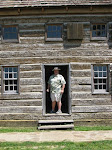It was freezing this morning in Burlington, West Virginia, a little village near property that was my home away from home in the summers and weekends of the first third of my life. Winter came quickly to those ridges and valleys after the first freeze and the weekend closest to October 15 always marked the seasonal closure for the cottage.
Today, the sycamores along the river are much taller but they still explode in yellow this time of year along with my favorite walnut trees. And the young maple I climbed every year until long after I matured has itself matured into a massive Fall fire tree. Sixty-five years ago I watched the men in their bulldozers reshape the creek bank and channel into a stony beach. It was much safer for the generation of bathers who enjoyed it but the creek remembered this affront and each year restored a small portion of its original character. Today the landscape appears very much as it did when I, my father, and perhaps my grandfather first saw it.
 |
| Patterson Creek ca. 1935 |
 |
| Burlington campground, 1959 |
During my first 28 years - through the summer of 1974 - I spent many weeks at "camp" every year, including several weekends of "cold camping" in the off-season. It 's an annual cycle I remember well. Freezing temperatures lingered into May so the campground usually opened on Memorial Day weekend. Although the prospect of returning to the cottage for another season was exciting it wasn't especially memorable. In the next six months the experiences accumulated: the family visits, friends old and new, the big fish, fireworks, hail storms, watching scary movies on a blanket under the stars, seeing a new airplane take shape. plane talking in general, and many more. Before long, October was on the calendar and it was time to winterizing the place. Declutter the cottage, clean house top to bottom, empty the refrigerator, empty the trash, drain the water heater and blow out the pipes, open all faucets, anti-freeze in all the sink traps, winterize the water pump, load the car with luggage and the season's walnut harvest that dried on the picnic table over the past week.
 |
| Hulling black walnuts at Burlington campground, 1967 |
Leaving it was like saying "Goodbye" to an old friend. Amid the blazing gold sycamores, brilliant fire oaks and maples, the smell of wood smoke, and a harvest of black walnuts, we went through the years-old closing procedure until the last items before our departure. After a final security check on all windows and the big front door it was time to pull the main breaker on the electric panel and leave through the kitchen door giving it an extra tug or two to make sure it was locked. From there it was down the driveway to the big gate at the main road, a bushel or two of fresh apples from the nearby orchards and and a two hour drive to Washington.
I haven't closed that big red door on the cottage or visited the little village nearby for over forty years now. There is a new generation there these days, all strangers. The score of people who taught me to love the place are gone and their cultural imprint on it continues to fade. The gleaming white post and rail fence is in decay. The cedar pavilion where I played for hours on end, observed picnickers enjoying their Labor Days, and listened to local old time music and fire and brimstone preachers lies in ruin. All the playground equipment - every piece massive, unsafe by today’s standards and shining in its blue, yellow and red paint - has disappeared. The drive-in theater next door closed a generation ago along with the little air field across the highway. Indeed the place is a foreign country. Only nature and memory endure.
A version of this post first appeared in 2008.

No comments:
Post a Comment